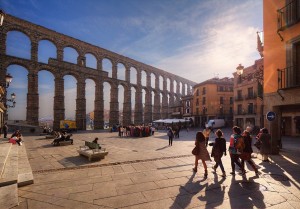
Spain has always gone to great lengths to meet its high demand for water, but when faced with a shortage, the town of Zaragoza took a different approach. When severe droughts in the early 1990s caused reservoirs to dry up, forest fires to rage, and crops to wither, it became clear that the inland city would not be able to meet their high demand. Víctor Viñuales, the director and co-founder of the Spanish NGO Fundación Ecología y Desarrollo (Ecology and Development Foundation), used his understanding of sociology to devise an innovative solution. He tells The Guardian:
“Trained as a sociologist, Viñuales wondered what would happen if municipalities focused less on making sure residents had access to all the water they wanted and more on reducing demand. From that thought began a 15-year experiment in Zaragoza that has revolutionised how many in Spain – from locals to public officials – think about water management.”
Viñuales lead an ambitious project that began with a challenge to the city’s citizens to save 1 billion liters of water in a year. He used a widespread media and social outreach campaign, offered free audits to help find water saving opportunities, gave discounts on water saving products, and even changed the city’s water bills so citizens could track their changes in usage. Zaragoza stepped up to the challenge.
“Today Viñuales rattles off statistic after statistic to show how this city of 700,000 has transformed itself. Between 1997 and 2012, per capita use of water in Zaragoza dropped from 150 litres/day to 99 litres/day. The drop even sustained an increase in population; between 1997 and 2008, the city’s population grew by 12% but daily water use dropped by 27%.”
Viñuales was able to use both social and economic factors to effect the lives of the people of Zaragoza and make a huge stride forward in sustainability. While he acknowledges the success he has seen, he reminds us that “To achieve profound change – whether it be environmental, social or cultural – you have to be prepared to take it on for the long haul. Here in Zaragoza we’ve had that profound change. The population grew, but we use fewer resources than before. It’s really what needs to be achieved on a global level.”
